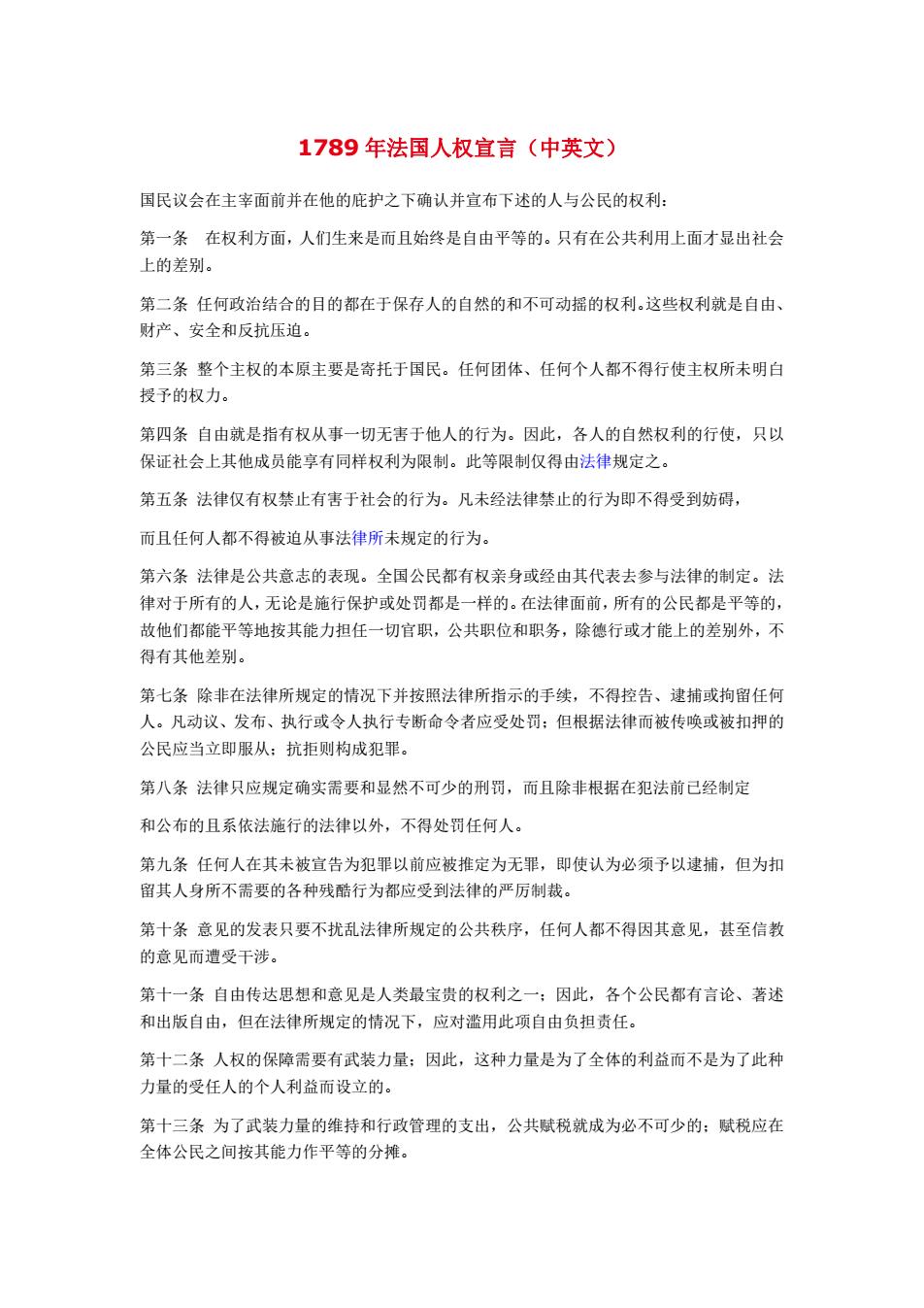
1789年法国人权宜言(中英文) 国民议会在主宰面前并在他的庇护之下确认并宣布下述的人与公民的权利: 第一条在权利方面,人们生来是而且始终是自由平等的。只有在公共利用上面才显出社会 上的差别。 第二条任何政治结合的目的都在于保存人的自然的和不可动摇的权利。这些权利就是自由、 财产、安全和反抗压迫。 第三条整个主权的本原主要是寄托于国民。任何团体、任何个人都不得行使主权所未明白 授予的权力。 第四条自由就是指有权从事一切无害于他人的行为。因此,各人的自然权利的行使,只以 保证社会上其他成员能享有同样权利为限制。此等限制仅得由法律规定之。 第五条法律仅有权禁止有害于社会的行为。凡未经法律禁止的行为即不得受到妨碍, 而且任何人都不得被迫从事法律所未规定的行为。 第六条法律是公共意志的表现。全国公民都有权亲身或经由其代表去参与法律的制定。法 律对于所有的人,无论是施行保护或处罚都是一样的。在法律面前,所有的公民都是平等的, 故他们都能平等地按其能力担任一切官职,公共职位和职务,除德行或才能上的差别外,不 得有其他差别。 第七条除非在法律所规定的情况下并按照法律所指示的手续,不得控告、逮捕或拘留任何 人。凡动议、发布、执行或令人执行专断命令者应受处罚:但根据法律而被传唤或被扣押的 公民应当立即服从:抗拒则构成犯罪。 第八条法律只应规定确实需要和显然不可少的刑罚,而且除非根据在犯法前己经制定 和公布的且系依法施行的法律以外,不得处罚任何人。 第九条任何人在其未被宣告为犯罪以前应被推定为无罪,即使认为必须予以逮捕,但为扣 留其人身所不需要的各种残酷行为都应受到法律的严厉制裁。 第十条意见的发表只要不扰乱法律所规定的公共秩序,任何人都不得因其意见,甚至信教 的意见而遭受干涉。 第十一条自由传达思想和意见是人类最宝贵的权利之一;因此,各个公民都有言论、著述 和出版自由,但在法律所规定的情况下,应对滥用此项自由负担责任。 第十二条人权的保障需要有武装力量:因此,这种力量是为了全体的利益而不是为了此种 力量的受任人的个人利益而设立的。 第十三条为了武装力量的维持和行政管理的支出,公共赋税就成为必不可少的:赋税应在 全体公民之间按其能力作平等的分摊
1789 年法国人权宣言(中英文) 国民议会在主宰面前并在他的庇护之下确认并宣布下述的人与公民的权利: 第一条 在权利方面,人们生来是而且始终是自由平等的。只有在公共利用上面才显出社会 上的差别。 第二条 任何政治结合的目的都在于保存人的自然的和不可动摇的权利。这些权利就是自由、 财产、安全和反抗压迫。 第三条 整个主权的本原主要是寄托于国民。任何团体、任何个人都不得行使主权所未明白 授予的权力。 第四条 自由就是指有权从事一切无害于他人的行为。因此,各人的自然权利的行使,只以 保证社会上其他成员能享有同样权利为限制。此等限制仅得由法律规定之。 第五条 法律仅有权禁止有害于社会的行为。凡未经法律禁止的行为即不得受到妨碍, 而且任何人都不得被迫从事法律所未规定的行为。 第六条 法律是公共意志的表现。全国公民都有权亲身或经由其代表去参与法律的制定。法 律对于所有的人,无论是施行保护或处罚都是一样的。在法律面前,所有的公民都是平等的, 故他们都能平等地按其能力担任一切官职,公共职位和职务,除德行或才能上的差别外,不 得有其他差别。 第七条 除非在法律所规定的情况下并按照法律所指示的手续,不得控告、逮捕或拘留任何 人。凡动议、发布、执行或令人执行专断命令者应受处罚;但根据法律而被传唤或被扣押的 公民应当立即服从;抗拒则构成犯罪。 第八条 法律只应规定确实需要和显然不可少的刑罚,而且除非根据在犯法前已经制定 和公布的且系依法施行的法律以外,不得处罚任何人。 第九条 任何人在其未被宣告为犯罪以前应被推定为无罪,即使认为必须予以逮捕,但为扣 留其人身所不需要的各种残酷行为都应受到法律的严厉制裁。 第十条 意见的发表只要不扰乱法律所规定的公共秩序,任何人都不得因其意见,甚至信教 的意见而遭受干涉。 第十一条 自由传达思想和意见是人类最宝贵的权利之一;因此,各个公民都有言论、著述 和出版自由,但在法律所规定的情况下,应对滥用此项自由负担责任。 第十二条 人权的保障需要有武装力量;因此,这种力量是为了全体的利益而不是为了此种 力量的受任人的个人利益而设立的。 第十三条 为了武装力量的维持和行政管理的支出,公共赋税就成为必不可少的;赋税应在 全体公民之间按其能力作平等的分摊
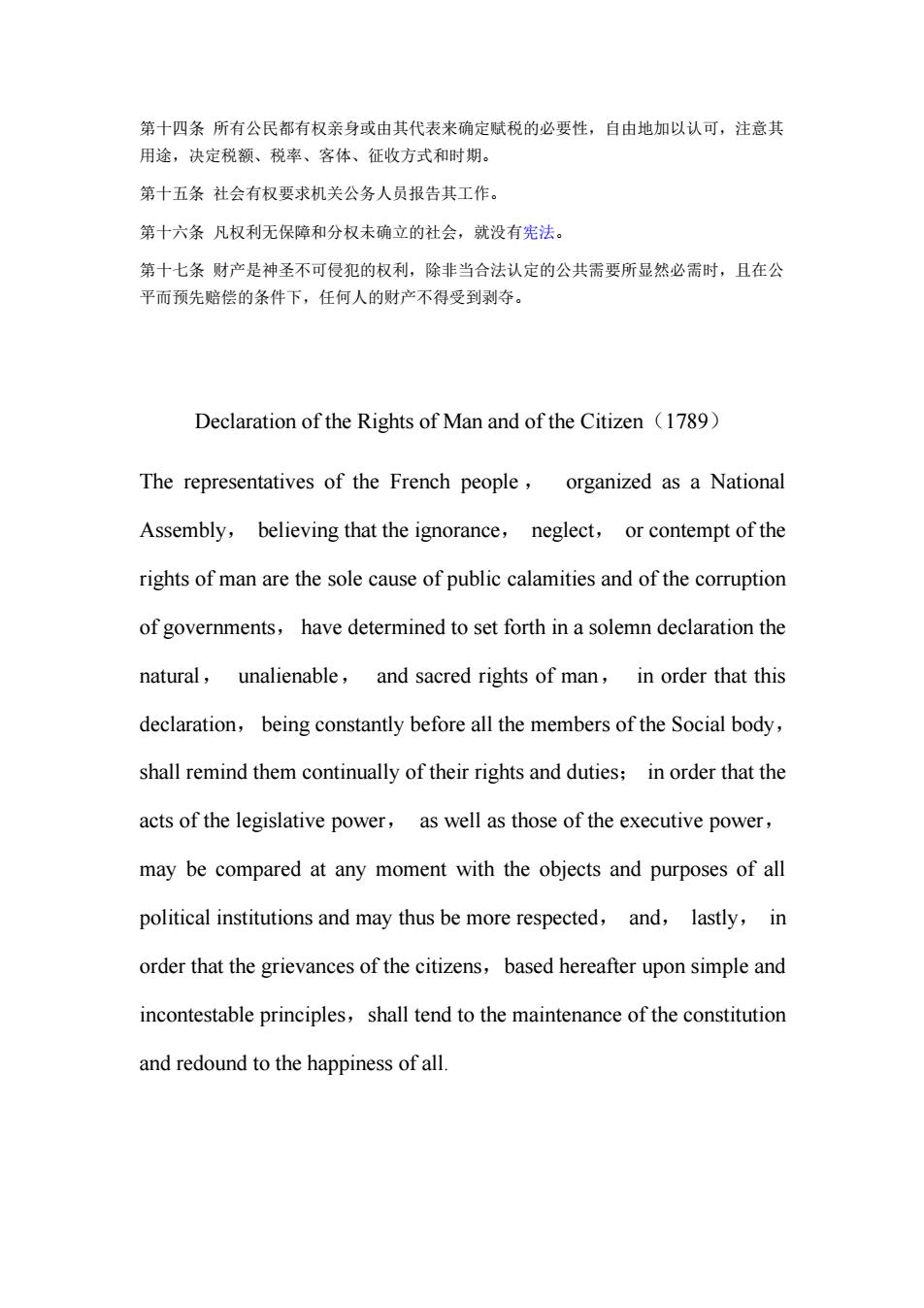
第十四条所有公民都有权亲身或由其代表来确定赋税的必要性,自由地加以认可,注意其 用途,决定税额、税率、客体、征收方式和时期。 第十五条社会有权要求机关公务人员报告其工作。 第十六条凡权利无保障和分权未确立的社会,就没有宪法。 第十七条财产是神圣不可侵犯的权利,除非当合法认定的公共需要所显然必需时,且在公 平而预先赔偿的条件下,任何人的财产不得受到剥夺。 Declaration of the Rights of Man and of the Citizen (1789) The representatives of the French people organized as a National Assembly,believing that the ignorance,neglect,or contempt of the rights of man are the sole cause of public calamities and of the corruption of governments,have determined to set forth in a solemn declaration the natural,unalienable,and sacred rights of man,in order that this declaration,being constantly before all the members of the Social body, shall remind them continually of their rights and duties;in order that the acts of the legislative power,as well as those of the executive power, may be compared at any moment with the objects and purposes of all political institutions and may thus be more respected,and,lastly,in order that the grievances of the citizens,based hereafter upon simple and incontestable principles,shall tend to the maintenance of the constitution and redound to the happiness of all
第十四条 所有公民都有权亲身或由其代表来确定赋税的必要性,自由地加以认可,注意其 用途,决定税额、税率、客体、征收方式和时期。 第十五条 社会有权要求机关公务人员报告其工作。 第十六条 凡权利无保障和分权未确立的社会,就没有宪法。 第十七条 财产是神圣不可侵犯的权利,除非当合法认定的公共需要所显然必需时,且在公 平而预先赔偿的条件下,任何人的财产不得受到剥夺。 Declaration of the Rights of Man and of the Citizen(1789) The representatives of the French people , organized as a National Assembly, believing that the ignorance, neglect, or contempt of the rights of man are the sole cause of public calamities and of the corruption of governments, have determined to set forth in a solemn declaration the natural, unalienable, and sacred rights of man, in order that this declaration,being constantly before all the members of the Social body, shall remind them continually of their rights and duties; in order that the acts of the legislative power, as well as those of the executive power, may be compared at any moment with the objects and purposes of all political institutions and may thus be more respected, and, lastly, in order that the grievances of the citizens,based hereafter upon simple and incontestable principles,shall tend to the maintenance of the constitution and redound to the happiness of all
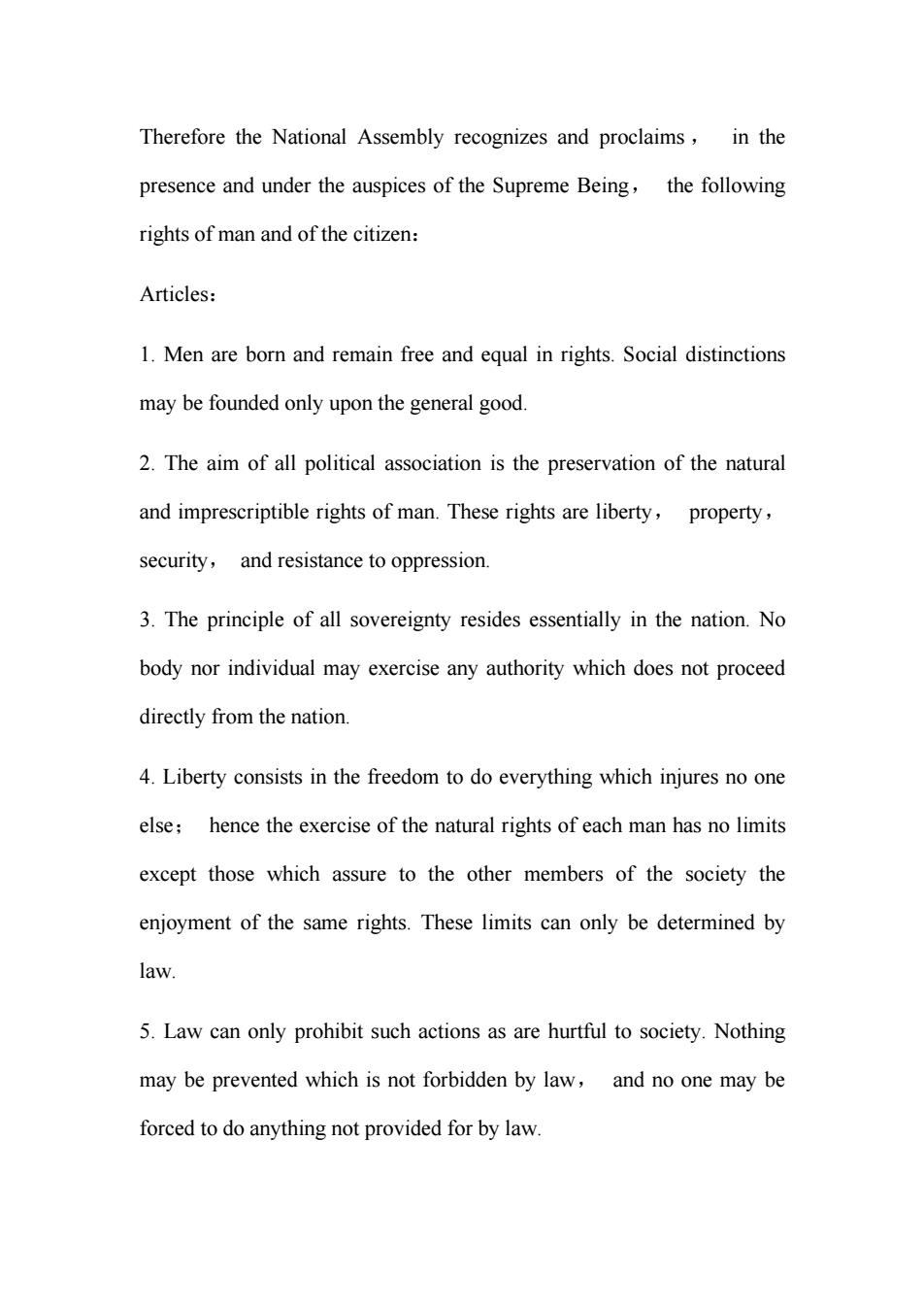
Therefore the National Assembly recognizes and proclaims,in the presence and under the auspices of the Supreme Being,the following rights of man and of the citizen: Articles: 1.Men are born and remain free and equal in rights.Social distinctions may be founded only upon the general good. 2.The aim of all political association is the preservation of the natural and imprescriptible rights of man.These rights are liberty,property, security,and resistance to oppression. 3.The principle of all sovereignty resides essentially in the nation.No body nor individual may exercise any authority which does not proceed directly from the nation. 4.Liberty consists in the freedom to do everything which injures no one else;hence the exercise of the natural rights of each man has no limits except those which assure to the other members of the society the enjoyment of the same rights.These limits can only be determined by law. 5.Law can only prohibit such actions as are hurtful to society.Nothing may be prevented which is not forbidden by law,and no one may be forced to do anything not provided for by law
Therefore the National Assembly recognizes and proclaims , in the presence and under the auspices of the Supreme Being, the following rights of man and of the citizen: Articles: 1. Men are born and remain free and equal in rights. Social distinctions may be founded only upon the general good. 2. The aim of all political association is the preservation of the natural and imprescriptible rights of man. These rights are liberty, property, security, and resistance to oppression. 3. The principle of all sovereignty resides essentially in the nation. No body nor individual may exercise any authority which does not proceed directly from the nation. 4. Liberty consists in the freedom to do everything which injures no one else; hence the exercise of the natural rights of each man has no limits except those which assure to the other members of the society the enjoyment of the same rights. These limits can only be determined by law. 5. Law can only prohibit such actions as are hurtful to society. Nothing may be prevented which is not forbidden by law, and no one may be forced to do anything not provided for by law

6.Law is the expression of the general will.Every citizen has a right to participate personally,or through his representative,in its foundation. It must be the same for all,whether it protects or punishes.All citizens, being equal in the eyes of the law,are equally eligible to all dignities and to all public positions and occupations,according to their abilities, and without distinction except that of their virtues and talents. 7.No person shall be accused,arrested,or imprisoned except in the cases and according to the forms prescribed by law.Any one soliciting, transmitting,executing,or causing to be executed,any arbitrary order,shall be punished.But any citizen summoned or arrested in virtue of the law shall submit without delay,as resistance constitutes an offense. 8.The law shall provide for such punishments only as are strictly and obviously necessary,and no one shall suffer punishment except it be legally inflicted in virtue of a law passed and promulgated before the commission of the offense. 9.As all persons are held innocent until they shall have been declared guilty,if arrest shall be deemed indispensable,all harshness not essential to the securing of the prisoners person shall be severely repressed by law
6. Law is the expression of the general will. Every citizen has a right to participate personally, or through his representative, in its foundation. It must be the same for all, whether it protects or punishes. All citizens, being equal in the eyes of the law, are equally eligible to all dignities and to all public positions and occupations, according to their abilities, and without distinction except that of their virtues and talents. 7. No person shall be accused, arrested, or imprisoned except in the cases and according to the forms prescribed by law. Any one soliciting, transmitting, executing, or causing to be executed, any arbitrary order, shall be punished. But any citizen summoned or arrested in virtue of the law shall submit without delay , as resistance constitutes an offense. 8. The law shall provide for such punishments only as are strictly and obviously necessary, and no one shall suffer punishment except it be legally inflicted in virtue of a law passed and promulgated before the commission of the offense. 9. As all persons are held innocent until they shall have been declared guilty, if arrest shall be deemed indispensable, all harshness not essential to the securing of the prisoners person shall be severely repressed by law
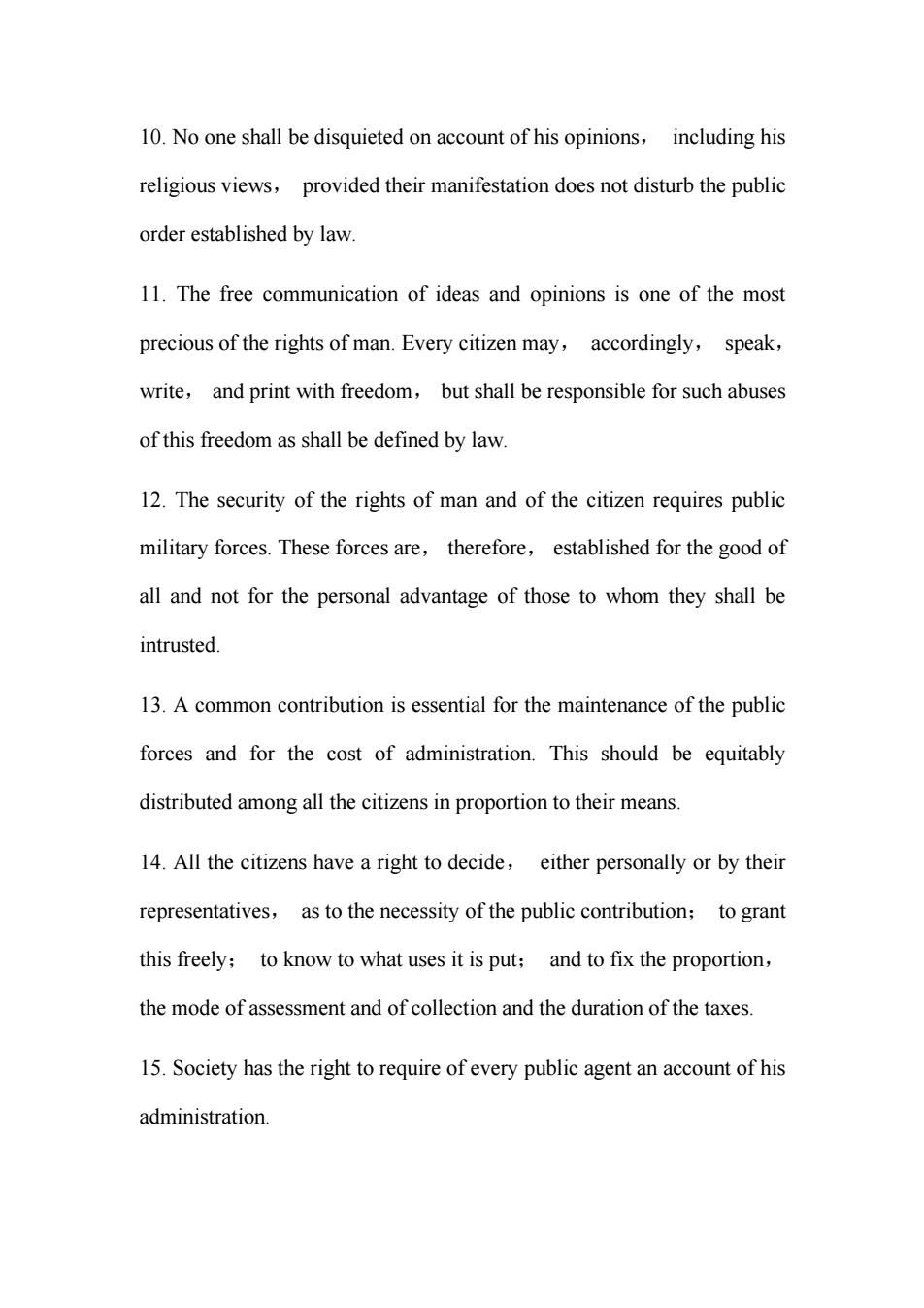
10.No one shall be disquieted on account of his opinions,including his religious views,provided their manifestation does not disturb the public order established by law. 11.The free communication of ideas and opinions is one of the most precious of the rights of man.Every citizen may,accordingly,speak, write,and print with freedom,but shall be responsible for such abuses of this freedom as shall be defined by law. 12.The security of the rights of man and of the citizen requires public military forces.These forces are,therefore,established for the good of all and not for the personal advantage of those to whom they shall be intrusted. 13.A common contribution is essential for the maintenance of the public forces and for the cost of administration.This should be equitably distributed among all the citizens in proportion to their means. 14.All the citizens have a right to decide,either personally or by their representatives,as to the necessity of the public contribution;to grant this freely;to know to what uses it is put;and to fix the proportion, the mode of assessment and of collection and the duration of the taxes. 15.Society has the right to require of every public agent an account of his administration
10. No one shall be disquieted on account of his opinions, including his religious views, provided their manifestation does not disturb the public order established by law. 11. The free communication of ideas and opinions is one of the most precious of the rights of man. Every citizen may, accordingly, speak, write, and print with freedom, but shall be responsible for such abuses of this freedom as shall be defined by law. 12. The security of the rights of man and of the citizen requires public military forces. These forces are, therefore, established for the good of all and not for the personal advantage of those to whom they shall be intrusted. 13. A common contribution is essential for the maintenance of the public forces and for the cost of administration. This should be equitably distributed among all the citizens in proportion to their means. 14. All the citizens have a right to decide, either personally or by their representatives, as to the necessity of the public contribution; to grant this freely; to know to what uses it is put; and to fix the proportion, the mode of assessment and of collection and the duration of the taxes. 15. Society has the right to require of every public agent an account of his administration
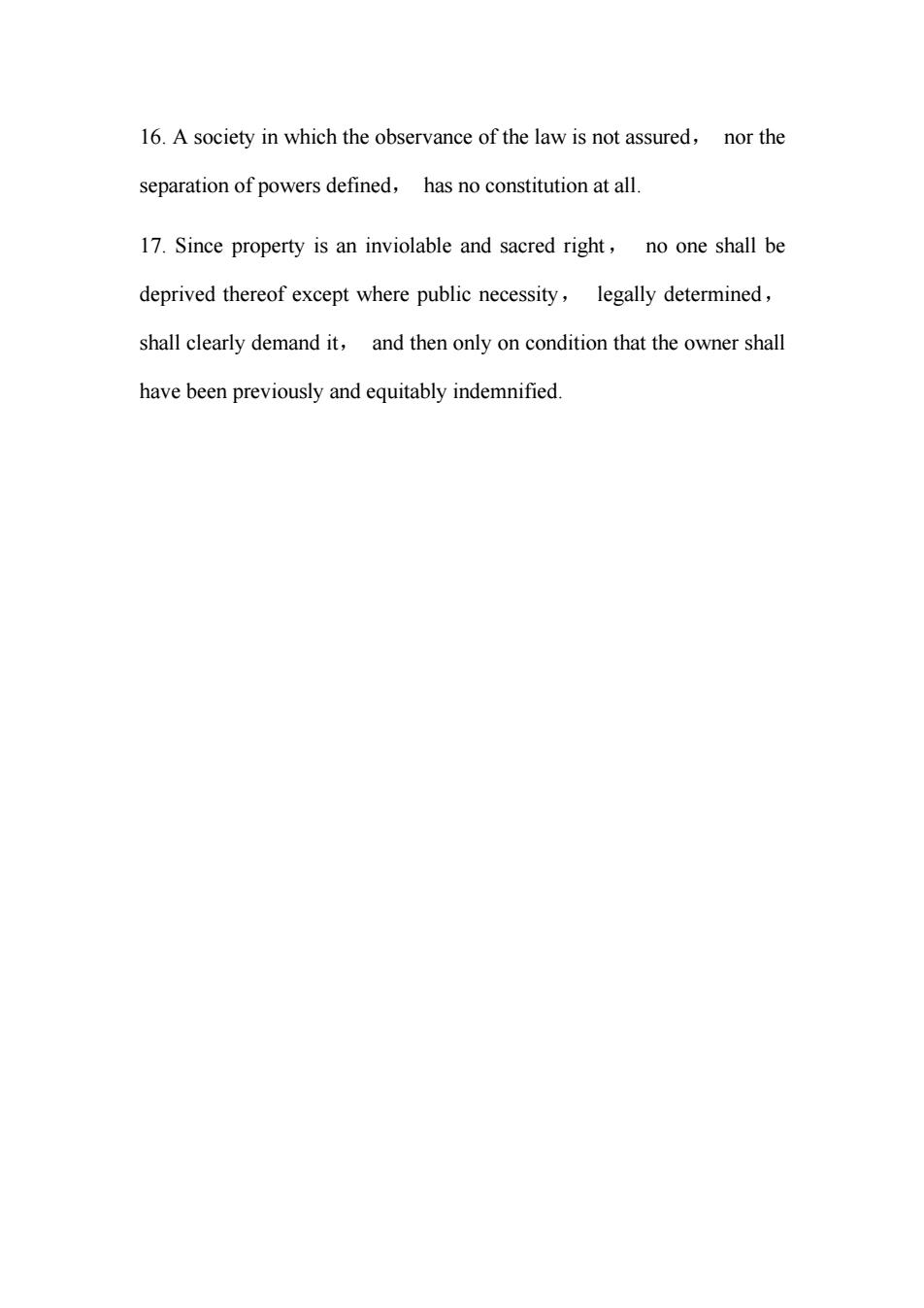
16.A society in which the observance of the law is not assured,nor the separation of powers defined,has no constitution at all. 17.Since property is an inviolable and sacred right,no one shall be deprived thereof except where public necessity,legally determined, shall clearly demand it,and then only on condition that the owner shall have been previously and equitably indemnified
16. A society in which the observance of the law is not assured, nor the separation of powers defined, has no constitution at all. 17. Since property is an inviolable and sacred right, no one shall be deprived thereof except where public necessity, legally determined, shall clearly demand it, and then only on condition that the owner shall have been previously and equitably indemnified